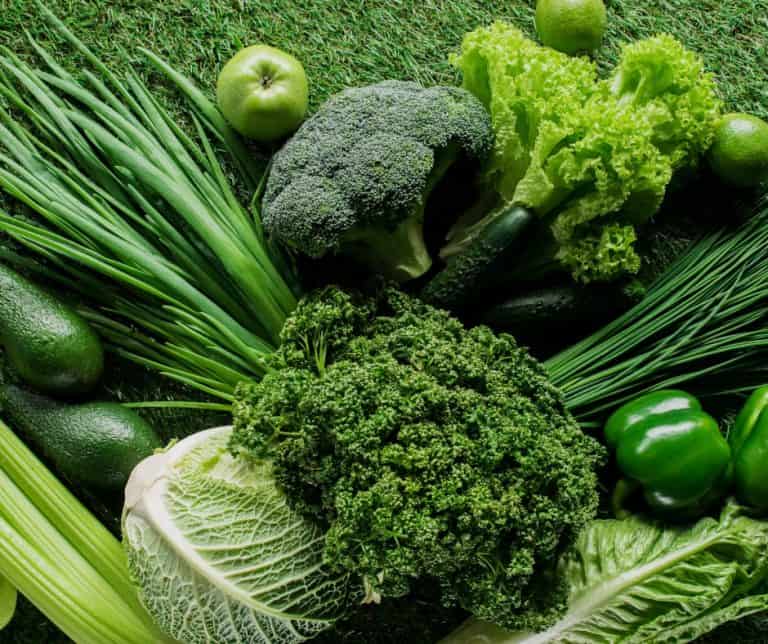Green vegetables offer various great benefits to our body and health that will make you believe in the old saying: “Eat your greens.” Green vegetables are rich in antioxidants, vitamins, minerals, and phytonutrients, and they act as overall health boosters. There are many reasons to eat and love your greens; however, in this article, we have compiled the 10 most compelling benefits of green vegetables, so let’s get into it.
10 benefits of green vegetables
Green vegetables provide great health benefits. Here are some of the benefits of green vegetables.
1- Low caloric food
Green vegetables are enjoyable low caloric food. Eat as much as you want without the fear of adding extra pounds to your weight. For instance, a cup full of kale only contains 33 calories, a cup of spinach contains only seven calories, and a cup of broccoli provides just over 30 calories.
2- Rich in nutrients
Green vegetables are not only low-calorie food, but they are also highly nutritious. They contain a lot of macronutrients and micronutrients. Among macronutrients, green vegetables provide carbohydrates, fiber, protein, and very little fat.
For instance, a cup of broccoli provides you with 6 grams of carbs, 2.4 grams of fiber, and over 2.5 grams of protein. These macronutrients, especially fiber and proteins, provide you with satisfaction and keep you full for a longer time.
Green vegetables are highly rich in micronutrients, such as minerals and vitamins. They provide important minerals like iron, calcium, potassium, and magnesium and vitamins, including vitamins A, K, C, E, and many of the B vitamins.
Vitamin K is an important micronutrient found in many green vegetables. It is a fat-soluble vitamin and is present in spinach, broccoli, iceberg lettuce, kale, and turnip greens, etc. Vitamin K is found to be beneficial for regulating blood clotting, protecting bones from osteoporosis, preventing atherosclerosis, and can help prevent diabetes.

3- Disease prevention
Researchers have found that increasing the intake of green vegetables helps prevent certain diseases. Green vegetables have low fat content and are rich in dietary fiber, folic acid, potassium, magnesium, vitamin C, and phytochemicals. Research has shown that increasing your intake of green vegetables by just one serving per day can lower the risk of cardiovascular disease by 11%.
The green vegetables are rich in magnesium and have a low glycemic index, which is ideal for preventing and treating diabetes. One extra serving per day can lower the risk of diabetes by 9%. Carotenoids, antioxidants, and flavonoids found in green vegetables can protect you from most cancers.
Green leafy vegetables contain the plant pigments lutein and zeaxanthin that help prevent strokes, heart disease, and breast and lung cancer. Kale and spinach contain the largest amount of lutein and zeaxanthin.
See also: Your Amazing Year-Round Vegetable Garden Plan
4- Support bone health
Green vegetables provide plenty of calcium for supporting optimal bone health. Vitamin K, magnesium, and calcium found in leafy greens produce osteocalcin. Osteocalcin plays an important role in bone matrix building. Green vegetables, such as broccoli and kale, contain a lot of vitamin K. Middle-aged women can decrease the risk of a hip fracture by 45% if they eat over one serving of green vegetables per day.
5- Eye protection
Green vegetables contain carotenoids (lutein and zeaxanthin), which are necessary for protecting your eyes from ultraviolet rays of sunlight. A diet rich in green vegetables can protect the eyes from macular degeneration in kids and cataracts in adults.
Lutein and zeaxanthin absorb excess light in plants to reduce sunlight damage. In eyes, lutein and zeaxanthin can be found in the macula. The American Journal of Epidemiology, Ophthalmology, and Archives of Ophthalmology have shown that people with more lutein and zeaxanthin in their diet have a lower risk of age-related macular degeneration (AMD).

6- Support your immune system and optimal brain function
The most promising benefits of green vegetables are their ability to support your immune system and optimal brain function. Vitamin A is important for immune function, and green vegetables, such as spinach, kale, and collard greens, are rich in vitamin A. Men are recommended to take 900 micrograms (mcg) of vitamin A each day, while women need 700 mcg. One cup full of raw spinach contains 469 mcg, one cup full of cooked kale contains 190 mcg, and one cup of collard greens contains 90 mcg.
According to a 2018 study published in the Journal of Clinical Medicine, vitamin A maintains the production of bone marrow. Bone marrow produces immune cells like lymphocytes, a type of white blood cell that can help fight infections.
Green vegetables have a significant impact on brain function as leafy greens such as kale, spinach, collards, and broccoli are rich in nutrients like vitamin K, lutein, folate, and beta-carotene necessary for brain health. A study published in Neurology in 2017 found that eating green vegetables every day is linked to a delay in cognitive decline.
See also: The Best Self-Watering Planters
7- Relieve Stress
Green vegetables help relieve stress. They are a rich source of folate. Folic acid helps in producing mood-regulating neurotransmitters such as dopamine, norepinephrine, or serotonin. Also, the magnesium found in green vegetables supports optimal vascular health.
According to a review published in the journal Nutritional Neuroscience in July 2018, a fiber-rich diet is found to be linked with reduced anxiety, depression, and stress. Green vegetables, such as kale and broccoli, are a rich source of fiber..
8- Glowing skin
Green vegetables are also an excellent source of beta-carotene. Beta-carotene is responsible for giving your skin a youthful glow. It also acts as a natural sunscreen and protects your skin from harmful UV rays of sunlight.
Kale is a good source of beta-carotene. According to data published by the U.S. Department of Agriculture (USDA), 100 grams of raw kale delivers 5.9 milligrams of beta-carotene.
It’s a heat-stable nutrient and studies have shown that cooking enhances the carotenoid release from vegetables, thereby improving the bioavailability of beta-carotene.
9- Maintain optimal gut health
If you are struggling with autoimmunity, gut infections, or food sensitivities, then adding green vegetables into your diet can help. According to research, green vegetables, such as broccoli or Brussels sprouts, activate a gene known as T-bet. This gene instructs precursor cells in your intestinal lining to produce innate lymphoid cells (ILCs). ILCs protect your body against gut infections and inflammation, food allergies, and bad bacteria.

10- Improves metabolism and keeps you hydrated
Leafy green vegetables are rich in vitamins, minerals, iron, and fiber, which are essential for improving your metabolism. The green vegetable broccoli is rich in calcium, which enhances the metabolic rate of the body and helps you in burning body fat.
Spinach is a good source of many nutrients like vitamin C, magnesium, potassium, and iron. Vitamin C found in spinach helps in enhancing the metabolic function of the body.
Also, green vegetables contain a lot of water. Adding green vegetables to your diet will always keep you hydrated, giving you a healthy body, skin, and hair.
See also: The Best Cutting Board with Containers
Conclusion
Leafy green vegetables provide you with promising health benefits. They are rich in antioxidants, minerals, fiber, and vitamins. They keep you hydrated and make you feel happier. Eating a healthy portion of green vegetables every day can protect you from various diseases, including heart disease, diabetes, and cancer, and can also protect your eyes. They support your immune system and are necessary for optimal brain function. Your body will feel more satisfied and full after eating green vegetables since you are getting all the essential nutrients your body requires to function properly.

